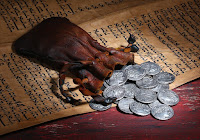Easter season brings various parts of the passion narrative into focus. The pinnacle of the narrative is of course the death, burial, and resurrection of Jesus Christ. But interwoven into the narratives are various threads of reality that focus upon the people that surrounded Jesus as well as the frailties of humanity. We applaud the sacrifice of Mary as she anoints Jesus (Matthew 26, Mark 14, and John 12) with expensive ointment. Jesus was more valuable to her than her precious ointment. Jesus responds to her action with appreciation seeing her action as preparation for his burial which was imminent. Judas especially (John 12:4-6) lacked appreciation for her action. He concluded it was a wasteful extravagance because sale of the ointment would have been better used in caring for the poor.
Peter’s confession of loyalty to Jesus
threads itself though the passion period. After Jesus revealed that he was
going to be betrayed and all would abandon him in the immediate future, Peter
boldly states that he will be loyal to Jesus no matter what others do (Matthew
26:33, 35). Later his good intentions unraveled. He did as Jesus predicted, and
betrayed Jesus three times (26:34). Pressure and danger often transform courage
into meaningless platitudes. Too often people are quick to condemn Peter’s
naivete and boastful arrogance, but upon further reflection see a similar
propensity in our own lives – our security is treasured more highly than Jesus.
Greed is a powerful force that can easily
control and destroy our lives. Socrates wisely concludes, “He who is not
contented with what he has, would not be contented with what he would like to
have.” Judas was possibly captured by the prospect of Jesus being a king and
how that would benefit his closest followers. Did he become disenchanted when
he began to surmise that his vision of what the kingdom would be like was not
the same as Jesus.’ He feared he had “hitched his wagon” to the wrong kind of
king. Pilot even needed Jesus’ kingdom clarified, and Jesus stated it clearly,
“My kingdom is not of this world” (John18:36). Too often people want God’s
kingdom to be just like the one they are in – just supersized. Such thinking
must be adjusted to become God-sized – the kingdom Jesus was offering.
One of my favorite short stories was written by Leo Tolstoy, “How Much Land Does a Man Need?” The story is about a greedy peasant named Pahom. He is never satisfied with what he had and assumes if he has more land he would be. He goes through a series of land acquisitions and finally is confronted by a deal he feels is too good to be true or ignored. He goes to the neighboring country of the Bashkirs. The tribal leaders tell him that they will sell him as much land as he wants for a thousand rubles. There was one condition. He can only acquire the land he can walk around in one day, marking the corners, and making it back to the starting point by sundown. If not, the land and money are forfeited. He agrees to the terms. He begins his task of marking his territory at sunrise. He greedily continues making the dimensions larger and larger. As the sun sets, he is thoroughly exhausted and pushes hard in the waning moments of the day to return to the starting point. He reaches the end of his quest and dies. The Chief of the Bashkirs laughs as Pahom is buried concluding that in the end, the only land Pahom needed was six feet, from head to foot—for his grave.
Greed blinded Pahom. Greed likely blinded Judas to abandon a priceless treasure, Jesus, and settle for thirty pieces of silver. That money was used to purchase the Potters Field where Judas was buried (Matthew 27:10). Jesus in a parable evaluates a rich, greedy man as a fool. “This is how it will be with whoever stores up things for themselves but is not rich toward God.” (Luke 12:20-21). Jesus asked on another occasion, “What good is it for someone to gain the whole world, yet forfeit their soul? Or what can anyone give in exchange for their soul?” (Mark 12:36-37). Great questions Judas should have answered earlier in life – as should each of us!

